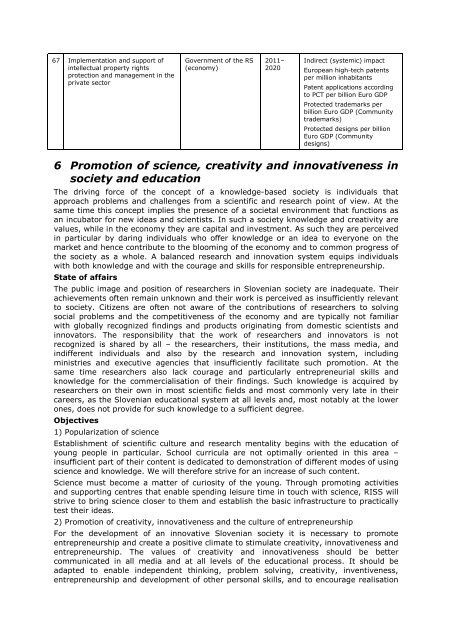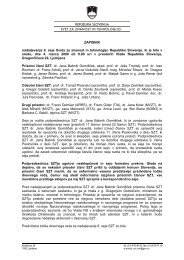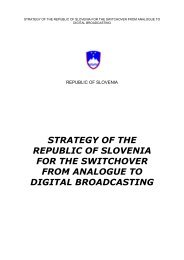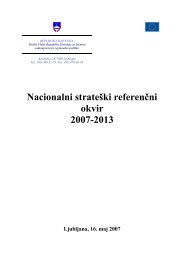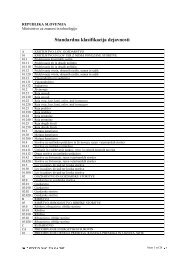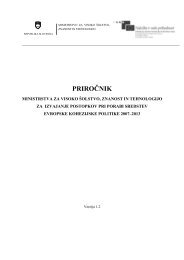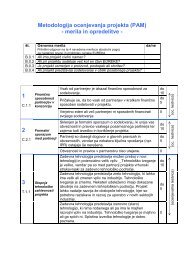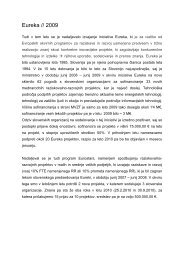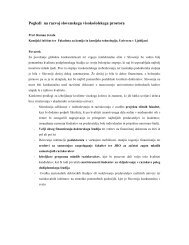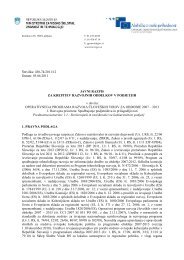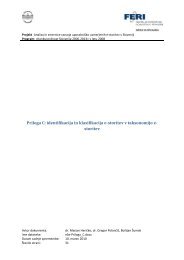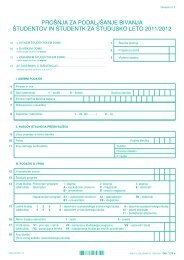Research and Innovation Strategy of Slovenia 2011-2020
Research and Innovation Strategy of Slovenia 2011-2020
Research and Innovation Strategy of Slovenia 2011-2020
- No tags were found...
Create successful ePaper yourself
Turn your PDF publications into a flip-book with our unique Google optimized e-Paper software.
67 Implementation <strong>and</strong> support <strong>of</strong>intellectual property rightsprotection <strong>and</strong> management in theprivate sectorGovernment <strong>of</strong> the RS(economy)<strong>2011</strong>–<strong>2020</strong>Indirect (systemic) impactEuropean high-tech patentsper million inhabitantsPatent applications accordingto PCT per billion Euro GDPProtected trademarks perbillion Euro GDP (Communitytrademarks)Protected designs per billionEuro GDP (Communitydesigns)6 Promotion <strong>of</strong> science, creativity <strong>and</strong> innovativeness insociety <strong>and</strong> educationThe driving force <strong>of</strong> the concept <strong>of</strong> a knowledge-based society is individuals thatapproach problems <strong>and</strong> challenges from a scientific <strong>and</strong> research point <strong>of</strong> view. At thesame time this concept implies the presence <strong>of</strong> a societal environment that functions asan incubator for new ideas <strong>and</strong> scientists. In such a society knowledge <strong>and</strong> creativity arevalues, while in the economy they are capital <strong>and</strong> investment. As such they are perceivedin particular by daring individuals who <strong>of</strong>fer knowledge or an idea to everyone on themarket <strong>and</strong> hence contribute to the blooming <strong>of</strong> the economy <strong>and</strong> to common progress <strong>of</strong>the society as a whole. A balanced research <strong>and</strong> innovation system equips individualswith both knowledge <strong>and</strong> with the courage <strong>and</strong> skills for responsible entrepreneurship.State <strong>of</strong> affairsThe public image <strong>and</strong> position <strong>of</strong> researchers in <strong>Slovenia</strong>n society are inadequate. Theirachievements <strong>of</strong>ten remain unknown <strong>and</strong> their work is perceived as insufficiently relevantto society. Citizens are <strong>of</strong>ten not aware <strong>of</strong> the contributions <strong>of</strong> researchers to solvingsocial problems <strong>and</strong> the competitiveness <strong>of</strong> the economy <strong>and</strong> are typically not familiarwith globally recognized findings <strong>and</strong> products originating from domestic scientists <strong>and</strong>innovators. The responsibility that the work <strong>of</strong> researchers <strong>and</strong> innovators is notrecognized is shared by all – the researchers, their institutions, the mass media, <strong>and</strong>indifferent individuals <strong>and</strong> also by the research <strong>and</strong> innovation system, includingministries <strong>and</strong> executive agencies that insufficiently facilitate such promotion. At thesame time researchers also lack courage <strong>and</strong> particularly entrepreneurial skills <strong>and</strong>knowledge for the commercialisation <strong>of</strong> their findings. Such knowledge is acquired byresearchers on their own in most scientific fields <strong>and</strong> most commonly very late in theircareers, as the <strong>Slovenia</strong>n educational system at all levels <strong>and</strong>, most notably at the lowerones, does not provide for such knowledge to a sufficient degree.Objectives1) Popularization <strong>of</strong> scienceEstablishment <strong>of</strong> scientific culture <strong>and</strong> research mentality begins with the education <strong>of</strong>young people in particular. School curricula are not optimally oriented in this area –insufficient part <strong>of</strong> their content is dedicated to demonstration <strong>of</strong> different modes <strong>of</strong> usingscience <strong>and</strong> knowledge. We will therefore strive for an increase <strong>of</strong> such content.Science must become a matter <strong>of</strong> curiosity <strong>of</strong> the young. Through promoting activities<strong>and</strong> supporting centres that enable spending leisure time in touch with science, RISS willstrive to bring science closer to them <strong>and</strong> establish the basic infrastructure to practicallytest their ideas.2) Promotion <strong>of</strong> creativity, innovativeness <strong>and</strong> the culture <strong>of</strong> entrepreneurshipFor the development <strong>of</strong> an innovative <strong>Slovenia</strong>n society it is necessary to promoteentrepreneurship <strong>and</strong> create a positive climate to stimulate creativity, innovativeness <strong>and</strong>entrepreneurship. The values <strong>of</strong> creativity <strong>and</strong> innovativeness should be bettercommunicated in all media <strong>and</strong> at all levels <strong>of</strong> the educational process. It should beadapted to enable independent thinking, problem solving, creativity, inventiveness,entrepreneurship <strong>and</strong> development <strong>of</strong> other personal skills, <strong>and</strong> to encourage realisation


